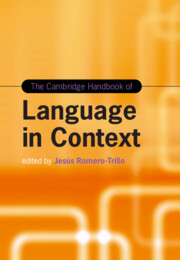Book contents
- The Cambridge Handbook of Language in Context
- Cambridge Handbooks in Language and Linguistics
- The Cambridge Handbook of Language in Context
- Copyright page
- Contents
- Figures
- Tables
- Contributors
- Acknowledgments
- Language in Context Studies
- Part I Language in Context: A Sociohistorical Perspective
- Part II Philosophical, Semantic, and Grammatical Approaches to Context
- Part III Pragmatic Approaches to Context
- 8 The Role of Context in Gricean and Neo-Gricean Pragmatics
- 9 Sociopragmatics and Context
- 10 Natural Semantic Metalanguage and Context
- 11 Relevance Theory and Context
- 12 The Interplay of Linguistic, Conceptual, and Encyclopedic Knowledge in Meaning Construction and Comprehension
- 13 Corpus Pragmatics
- 14 Prosodic Pragmatics in Context
- Part IV Applications of Context Studies
- Part V Advances in Multimodal and Technological Context-Based Research
- Index
- References
11 - Relevance Theory and Context
from Part III - Pragmatic Approaches to Context
Published online by Cambridge University Press: 30 November 2023
- The Cambridge Handbook of Language in Context
- Cambridge Handbooks in Language and Linguistics
- The Cambridge Handbook of Language in Context
- Copyright page
- Contents
- Figures
- Tables
- Contributors
- Acknowledgments
- Language in Context Studies
- Part I Language in Context: A Sociohistorical Perspective
- Part II Philosophical, Semantic, and Grammatical Approaches to Context
- Part III Pragmatic Approaches to Context
- 8 The Role of Context in Gricean and Neo-Gricean Pragmatics
- 9 Sociopragmatics and Context
- 10 Natural Semantic Metalanguage and Context
- 11 Relevance Theory and Context
- 12 The Interplay of Linguistic, Conceptual, and Encyclopedic Knowledge in Meaning Construction and Comprehension
- 13 Corpus Pragmatics
- 14 Prosodic Pragmatics in Context
- Part IV Applications of Context Studies
- Part V Advances in Multimodal and Technological Context-Based Research
- Index
- References
Summary
This chapter considers the treatment of context in relevance theory, a cognitively oriented pragmatic theory which sees human communication and cognition as governed by the search for relevance. Utterance interpretation crucially relies on context, and a central question for pragmatics is about how hearers find the right contextual information to use in interpreting an utterance, and thus succeed in identifying the speaker’s meaning. According to relevance theory, utterances raise precise and predictable expectations of relevance which guide the hearer in every aspect of utterance interpretation, from disambiguation and reference resolution to the choice of contextual information and the derivation of implicatures (i.e. intended implications). After outlining the main assumptions of Relevance Theory, the chapter illustrates with examples how these different aspects of interpretation fit together, and compares Relevance Theory’s treatment of context with some alternative treatments discussed in the pragmatic literature, including those based on a notion of “common ground.”
Keywords
- Type
- Chapter
- Information
- The Cambridge Handbook of Language in Context , pp. 247 - 267Publisher: Cambridge University PressPrint publication year: 2023
References
- 1
- Cited by



